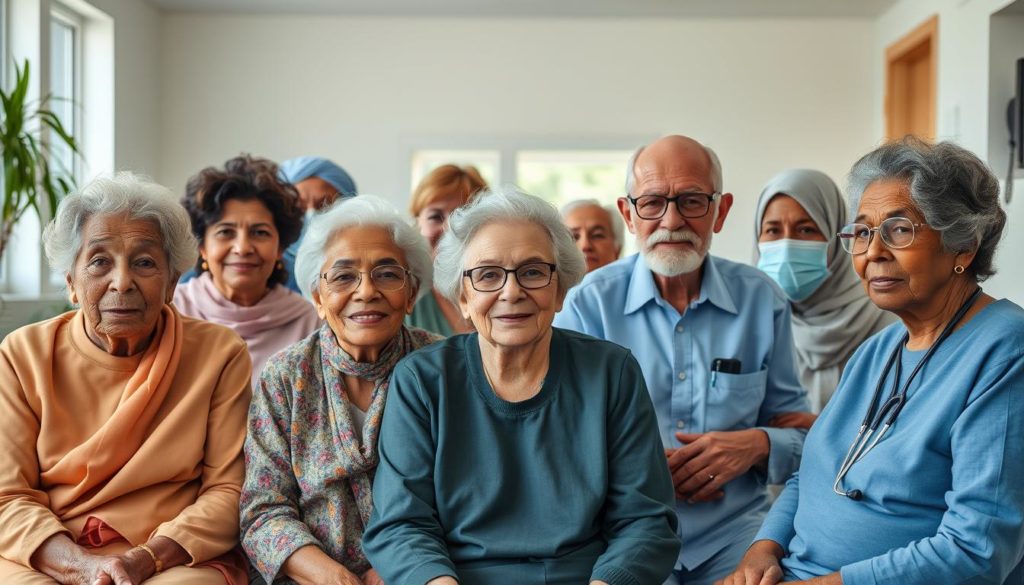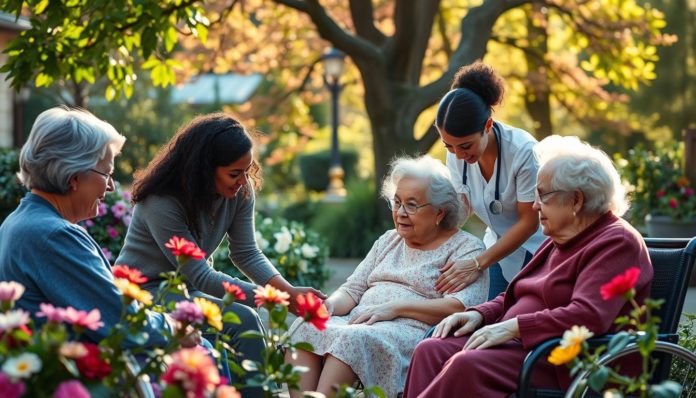Did you know adults over 85 have a 50% chance of getting Alzheimer’s disease? It affects everyone, no matter their race, sex, or background. Yet, culture shapes how we see and treat it.
In Black, Hispanic, and Asian American groups, many see dementia signs as just getting old. This mix-up can lead to missed diagnoses. To make health care fair for all, we must consider these cultural impacts.
The Importance of Cultural Competence in Alzheimer’s Care
Effective Alzheimer’s care is more than medical know-how; it needs cultural competence. This means understanding and respecting cultural differences. Such respect makes the care environment better for everyone.

Understanding Cultural Beliefs
Cultural beliefs shape how people see illness and treatment. In Alzheimer’s care, knowing these beliefs helps in treating patients. For example, some cultures have more stigma, which can make people avoid seeking help.
Navigating Health Disparities
It’s vital to tackle health disparities for good Alzheimer’s care. These issues come from different places, like income levels and healthcare access. Cultural competence helps professionals understand and reduce these gaps, ensuring care for all.
The Role of Education and Awareness
Education and awareness are key to connecting diverse groups with Alzheimer’s care. By focusing on cultural competence, caregivers can offer better support. This can mean earlier diagnoses and improved outcomes, leading to fairer healthcare.
Impact of Health Disparities on Dementia Care
Dementia care faces a big challenge with health disparities. These disparities hurt how diverse communities get medical help. By looking into these issues, we learn about the deep inequalities in the healthcare system.

Availability of Resources in Diverse Communities
Many communities don’t have enough medical support. They lack dementia care facilities, trained staff, and good support systems. This issue makes the care gap wider, leaving people without needed dementia care.
Barriers to Seeking Medical Help
Diverse groups face many hurdles when seeking medical help. Language problems can make it hard to understand doctors and choose treatments wisely. Cultural views on dementia might stop people from talking about their symptoms or getting checked.
There’s also mistrust towards medical centers. This makes it even harder to get the right help on time.
Race, Culture, and Alzheimer’s Care: Unique Challenges
Alzheimer’s disease brings unique healthcare challenges to people from ethnic and racial minorities. The stigma around dementia stops many from getting early help. This issue is worse because of a long history of mistrust in medical systems.
Different groups have their own ideas about health and caring for the sick. These ideas may clash with Western medicine. For example, some prefer natural remedies to modern medicine.
“It’s crucial to understand the cultural context when addressing Alzheimer’s in diverse populations,” says Dr. Maria Carrillo, Chief Science Officer at the Alzheimer’s Association.
To deal with these unique healthcare challenges, providers must make care plans that respect cultural differences. Knowing how race affects dementia care helps give better, kinder support to those with Alzheimer’s.
By valuing cultural diversity, we can give fair care to everyone. This challenge isn’t just about race. It’s about equitable treatment in dementia care for all.
The African American Experience with Alzheimer’s Disease
It’s key to understand how Alzheimer’s disease uniquely impacts African Americans. This includes looking at the higher risk they face and how history affects their trust. It’s also vital to discuss heart health’s role in Alzheimer’s among African Americans.
Higher Risk and Lower Diagnosis Rates
African Americans are more likely to get Alzheimer’s. But they often get diagnosed less due to healthcare barriers. It’s important to make healthcare more fair. This will help find and treat Alzheimer’s earlier in African Americans.
Historical Distrust in Medical Institutions
Many African Americans don’t trust medical systems because of past wrongs and racism. This fear stops some from getting needed medical care. It makes it harder to find and treat illnesses like Alzheimer’s early.
The Role of Cardiovascular Health
Heart health is closely linked to Alzheimer’s in African Americans. They often have more heart health issues, raising their Alzheimer’s risk. Taking care of your heart can lower this risk and improve overall health.
| Factors | Impact on Alzheimer’s |
|---|---|
| Higher Risk | Increased prevalence of Alzheimer’s in African Americans |
| Lower Diagnosis Rates | Delayed or missed diagnosis, complicating treatment |
| Cardiovascular Health | Higher incidence of cardiovascular considerations in dementia |
| Historical Distrust | Reluctance to seek medical help, further complicating healthcare barriers |
Alzheimer’s and Hispanic Americans: Cultural Sensitivity Matters
Alzheimer’s care for Hispanic Americans requires an understanding of cultural sensitivity. Knowing the unique challenges is key to caring better and more compassionately.
Strong Family Ties and Delay in Diagnosis
Hispanic families often prefer caring for relatives at home due to strong family bonds. This beautiful tradition may delay seeking medical help. They might miss early dementia signs while trying to manage symptoms themselves.
Cultural and Language Barriers
Cultural and language obstacles make dementia care harder for Hispanic Americans. Not speaking English well makes it tough to get and understand medical info. Traditional views on aging and health also affect how symptoms are seen and handled.
Importance of Ethnic-Specific Care Approaches
It’s vital to recognize the unique needs and cultural backgrounds of Hispanic Americans in Alzheimer’s care. Ethnic-specific strategies help overcome challenges and ensure care respects cultural values. This approach helps everyone get the quality care they need.
Asian American Perspectives on Alzheimer’s Disease
Discussing Alzheimer’s disease in Asian American circles shows how culture affects caregiving. Family and cultural beliefs drive many decisions, making the health care journey challenging for Asian Americans.
Filial Piety and Caregiving Responsibilities
In Asian cultures, caring for elders is a core value. This means families often delay seeking Alzheimer’s care. The result? Family members must juggle work, personal life, and caring for a loved one with dementia. This impacts Asian American health care greatly.
Limited Knowledge and Stigma
Lack of knowledge and stigma about dementia are big issues. Some may not recognize Alzheimer’s symptoms early on, leading to late action. Stigma around mental health makes open conversation hard. Access to understanding and culturally-tailored resources is key. More info on this topic is available here.
Fear of Clinical Trials
Many Asian Americans fear joining clinical trials, often because of past misuses in research. Overcoming these fears and gaining trust is crucial. It will help advance Alzheimer’s research and treatments, benefiting this community.
Addressing Alzheimer’s in Native American Communities
In Native American communities, showing respect for elders is very important. This respect shapes how people with dementia are cared for. It impacts caregiving and views on Alzheimer’s disease.
Respect for Elders and Home Care
Elder respect is key in Native American dementia care. Families often choose to care for elders at home rather than seek outside help. This home care honors their life’s work and keeps cultural traditions alive. Yet, it can also limit access to specialized Alzheimer’s care.
Misunderstanding Symptoms
Understanding Alzheimer’s symptoms is a big challenge. Often, these signs are seen as normal aging or spiritual changes. This makes it hard to diagnose and treat Alzheimer’s early. Education and healthcare that respect culture can help improve life for those with Alzheimer’s in these communities.
Challenges Faced by the LGBTQ Community in Dementia Care
Addressing Alzheimer’s care for the LGBTQ community brings unique challenges. Common issues include different caregiver roles, limited support from family, and fighting social stigma in dementia care.
Unique Caregiver Concerns
LGBTQ caregivers often face a lack of understanding in traditional care settings. This makes existing dementia care challenges harder, needing special training for caregivers. They need to learn how to meet this community’s unique needs.
Lack of Family Support
LGBTQ individuals may not have strong support networks like their peers do. Many are separated from their families, impacting care and support availability. Friends or chosen families often step in, yet they struggle to get the necessary resources due to limited recognition.
Combating Stigma and Isolation
Stigma is a big barrier, increasing isolation for LGBTQ caregivers of those with dementia. The stigma of dementia and sexual orientation can cause even more loneliness. It’s vital to create accepting spaces.
Addressing the unique issues at the crossroads of Alzheimer’s and LGBTQ identity is vital. We must fight stigma, caregiver isolation, and ensure everyone gets the care they need. For more information, check out this LGBT Dementia Issues Brief.
Strategies to Improve Culturally Competent Alzheimer’s Care
To better serve Alzheimer’s patients from various backgrounds, a comprehensive approach is essential. It starts with personalized care planning. Involving family and the community in creating care plans helps. This method makes sure the care meets the patient’s cultural and personal needs.
Custom communication methods play a key role too. Health workers must learn to talk in ways that respect cultural differences. They should use preferred languages and be aware of cultural beliefs. Such practices help in building trust between patients and healthcare providers.
Hiring diverse medical staff is equally important. Medical facilities should aim to reflect the communities they serve through their workforce. A team from different cultural backgrounds will offer relatable and caring support. It also fights ethnic stereotypes, improving dementia care for everyone.
FAQ
What is the importance of cultural competence in Alzheimer’s care?
Cultural competence is key in Alzheimer’s care. It enables caregivers to respect and understand diverse cultural backgrounds. This understanding impacts the treatment and perception of symptoms, especially where stigma may influence health outcomes.
How do cultural beliefs impact Alzheimer’s care?
Cultural beliefs shape how Alzheimer’s is viewed. In some communities, people may see symptoms as part of normal aging. This can delay getting the right diagnosis and treatment. Being aware of these beliefs helps provide better care.
What health disparities exist in dementia care?
Dementia care faces challenges like limited resources and language barriers. Ethnic minorities and underserved areas often receive less care. This leads to poorer health outcomes for them.
Why is early diagnosis important in managing Alzheimer’s disease?
Catching Alzheimer’s early is crucial. It means caregivers can start treatments sooner. This can slow down the disease and help improve life quality. Early diagnosis also helps families prepare for future needs.
How does cardiovascular health relate to Alzheimer’s risk in African Americans?
There’s a strong link between heart health and Alzheimer’s, especially for African Americans. Poor heart health raises Alzheimer’s risk. This shows the need for early prevention and better healthcare access.
What role do family ties play in Alzheimer’s care among Hispanic Americans?
In Hispanic families, caregiving typically falls to relatives. This may slow down seeking professional help. It’s critical to overcome cultural and language barriers to support Hispanic Americans with Alzheimer’s.
What unique challenges do Asian American communities face in Alzheimer’s care?
Stigma is a big hurdle in Asian American communities. Care is usually provided by the family. Lack of Alzheimer’s knowledge and fear of clinical trials make care and research participation difficult.
How are Alzheimer’s symptoms often misinterpreted in Native American communities?
In Native American groups, people often view Alzheimer’s symptoms as normal aging. Sometimes, they see it as spiritual. This view can delay getting the correct care. It shows the need for culturally sensitive education and healthcare.
What specific challenges does the LGBTQ community face in dementia care?
The LGBTQ community encounters specific issues like limited family support and stigma. These factors can postpone diagnosis and care. Ensuring culturally competent support and resources is crucial for them.
What strategies can elevate culturally competent Alzheimer’s care?
Improving Alzheimer’s care means personalizing care plans and including family. Also, using tailored communication, hiring diverse staff, and overcoming stereotypes are key strategies. These efforts help create a more inclusive and fair treatment environment.


